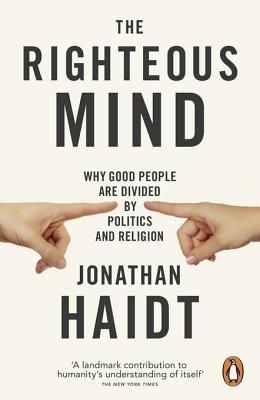More on this book
Community
Kindle Notes & Highlights
They see confirmation of their grand narrative everywhere,
liberals and conservatives are like yin and yang—both are “necessary elements of a healthy state of political life,” as John Stuart Mill put it.
Liberals are experts in care; they are better able to see the victims of existing social arrangements, and they continually push us to update those arrangements and invent new ones.
governments can and should restrain corporate superorganisms,
some big problems really can be solved by regulation.
libertarians are right that markets are miraculous
(at least when their externalities and other failures can be addressed),
social conservatives are right that you don’t usually help the bees b...
This highlight has been truncated due to consecutive passage length restrictions.
Manic...
This highlight has been truncated due to consecutive passage length restrictions.
Morality binds and blinds.
It binds us into ideological teams
It blinds us to the fact that each team is composed of good people who have som...
This highlight has been truncated due to consecutive passage length restrictions.
Intuitions come first, strategic reasoning second.I
the social intuitionist model,
“rationalist de...
This highlight has been truncated due to consecutive passage length restrictions.
Hume
This highlight has been truncated due to consecutive passage length restrictions.
Gl...
This highlight has been truncated due to consecutive passage length restrictions.
a small rider on a very large elephant.
There’s more to morality than harm and fairness.
India, and how it helped me to step out of my moral matrix
the righteous mind is like a tongue with six ...
This highlight has been truncated due to consecutive passage length restrictions.
Moral Foundation...
This highlight has been truncated due to consecutive passage length restrictions.
YourMora...
This highlight has been truncated due to consecutive passage length restrictions.
Richard S...
This highlight has been truncated due to consecutive passage length restrictions.
Emile Du...
This highlight has been truncated due to consecutive passage length restrictions.
suspicion of moral monists.
Isaiah Berlin
not a relativist; I
plurality of ideals,
There is not an infinity of [values]:
if a man pursues one of these values, I, who do not, am able to understand why he pursues it
morality binds and blinds.
multilevel selection,
Homo d...
This highlight has been truncated due to consecutive passage length restrictions.
We are selfish and we are...
This highlight has been truncated due to consecutive passage length restrictions.
90 percent chimp and 10 p...
This highlight has been truncated due to consecutive passage length restrictions.
hive switch,
This book explained why people are divided by politics and religion. The answer is not, as Manichaeans would have it, because some people are good and others are evil. Instead, the explanation is that our minds were designed for groupish righteousness.
We are deeply intuitive creatures whose gut feelings drive our strategic reasoning. This makes it difficult—but not impossible—to connect with those who live in other matrices,
When separated, the two principles are: Intuitive primacy but not dictatorship, and moral thinking is for social doing.
My conclusion at graduation was that psychology and literature would have been better fields to help a young person on an existential quest. But philosophy has gotten better since then—see Wolf 2010.
Empiricism has two different meanings.
Carol Gilligan
“ethic of care,”
Martin H...
This highlight has been truncated due to consecutive passage length restrictions.
emp...
This highlight has been truncated due to consecutive passage length restrictions.
moral dumbfounding.
Daniel Kahneman has long called these two kinds of cognition “system 1” (the elephant) and “system 2” (the rider). See Kahneman 2011 for a highly readable account of thinking and decision making from a two-system perspective.
“My thinking is first and last and always for the sake of my doing”
Susan Fiske (1993) applied James’s functionalism to social cognition, abbreviating his dictum as “thinking is for doing.”


